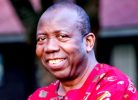By Mekonnen Teshome- Pretoria, South Africa– The African-wide scientists’ organization, African Academy of Sciences (AAS), has called on African leaders to work for the free movement of African scientists.
In connection with the opening of the 11th General Assembly of the Academy, Organized as part of the Science Forum South Africa 2018 (SFSA), President of AAS Prof.
Felix Dapare Dakora told African journalists in Pretoria that if Africa cannot ensure the free movement of its scientists, the continent would not achieve the AU Agenda 2063.
President of South Africa, H.E. Cyril Ramaphosa is expected to open the Science Forum South Africa 2018 (SFSA) on Wednesday at the CSIR International Convention Centre, Pretoria.
Prof. Felix indicated that the issue of free movement of African scientists is one of the agendas of AAS’s 11th General Assembly. “As we speak, for example, there are a number of our colleagues who couldn’t come to South Africa for this meeting.”
“We cannot collaborate do research to achieve the AU agenda 2063, if there is no free movement of scientist across the board between the various African countries,” Prof. Felix added.
“Therefore, we remain concerned as academic society about the difficulties of scientists to move from one country to the other and we want to put it in the agenda of the Science Forum South Africa 2018 (SFSA) [to be opened on December 12, 2018 in Pretoria] and get it across to our leaders.”
On the other hand, South African Minister of Science & Technology Hon. Mmamoloko Kubayi-Ngubane, while opening the AAS General Assembly promised to assist in tackling the challenges of African scientists and to work in collaboration with AAS to help the South African government design the right policy to promote science and innovation.
She said : “ Delivering scientific advice for policy-making to ensure our continent responds effectively to the Sustainable Development Goals by implementing pan-African research and innovation funding programmes are some of the critical roles the AAS should play – and ones in which we are determined to support the Academy.”
The African Union’s long-term agenda includes visa-free travel for all African citizens as a means of facilitating trade and regional cooperation. A common African passport, scheduled to roll out by 2020, is expected to boost trade and investment.
The idea of an African passport dates back a quarter of a century but has failed to catch on with countries that fear an increase in smuggling, illegal immigration, terrorism, and the spread of disease as well as a negative impact on local job markets.
Panelists during the AAS sessions also discussed the policy challenges of African counties with regard to the promotion of science and innovation. They have also recommended African leaders to use of scientific knowledge to design effective policies.
Prof. Vladimir Sucha, Director General of the Joint Research Centre of the European Commission’s Science and Knowledge Service, in his presentation “Science for Policy” underlined the vitality of scientific and evidence-informed policymaking for Africa.
Prof. Vladimir says Science and politics roles : “Science and politics are different Science and politics have fundamentally different goals – the aim of science is to know and the goal of politics is to act.”
However, he said, both need to complement each other and especially policy makers need to be evidence-informed and engage scientists.
AAS, based in Nairobi, Kenya, has adopted five strategic areas for 2018-2022 – Health and Wellbeing, Environment and Climate Change, Social sciences and Humanities, Natural sciences and Policy and Governance.
The AAS 11th AAS General Assembly, 10-11 December 2018, is organised in collaboration with South Africa’s Department of Science and Technology (DST) as part of the Science Forum South Africa 2018 (SFSA) , expected to be opened on Wednesday , December 12, 2018 by the President of South Africa, H.E. Cyril Ramaphosa .
The 2018 General Assembly is focused on creating a platform for scientists, policymakers and the private sector to ignite conversations on how to mobilise support for science, technology and innovation (STI) that yields commitments to build long-term capacity for infrastructure and human resources. The theme of the GA is ‘Our history, impact and future.’

